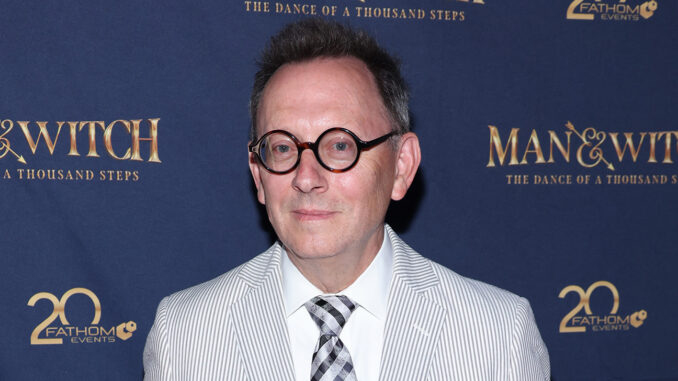
The Calculated Gaze Meets the Kaleidoscope Mind: Michael Emerson and the Meta-Drama of Elsbeth
The announcement of Michael Emerson joining the cast of Elsbeth as Judge Milton Crawford, setting him directly head-to-head with Carrie Preston’s titular character, isn’t just casting news; it’s an event. It promises a masterclass in nuanced performance and, more significantly, creates a fascinating interplay between the established personas of these real-life actors and the fictional characters they embody on screen. This collision of calculated gravitas and kaleidoscopic brilliance isn’t merely good television; it’s a meta-narrative, a dialogue between past performances and present expectations, that elevates the drama to an art form.
Michael Emerson arrives in the legal world of Elsbeth trailing an indelible shadow of iconic roles. From the chillingly complex Ben Linus in Lost to the enigmatic Harold Finch in Person of Interest, Emerson has carved a niche for characters defined by their intellectual depth, their hidden agendas, and an unsettling calm that often belies a storm of manipulation or profound moral conviction. His distinctive, almost hypnotic voice, his incisive gaze, and his ability to convey immense intelligence with minimal overt expression immediately inform our perception of Judge Milton Crawford. We don’t just see a judge; we see a Michael Emerson judge. This isn’t a figure of simple judicial decorum, but one imbued with a pre-existing aura of strategic thinking, an unseen chess player whose pronouncements carry an unspoken weight. The audience instinctively anticipates layers, hidden motives, and a keen observational mind behind Crawford’s gavel – expectations entirely predicated on the actor’s storied career.
Across the courtroom, standing as the very antithesis to Crawford’s methodical order, is Carrie Preston’s Elsbeth Tascioni. Preston has sculpted Elsbeth into one of television’s most singularly charming and deceptively brilliant characters. With her perpetually flustered demeanor, her seemingly non-sequitur observations, and a fashion sense that defies categorization, Elsbeth is a walking, talking disarming mechanism. Yet, beneath the quirky exterior lies a razor-sharp mind capable of connecting the most disparate dots, unearthing truth through a unique, often chaotic, process of observation. Preston’s physical comedy, her unique vocal inflections, and her gift for embodying genuine, empathetic intelligence have made Elsbeth a beloved and formidable presence. She is a character designed to be underestimated, to slip past defenses, and to expose the hidden vulnerabilities of her opponents with an almost accidental grace.
The “head-to-head” dynamic between Crawford and Elsbeth, therefore, becomes a thrilling clash of diametrically opposed forces. On one side, we have Emerson’s Crawford, likely representing the pinnacle of judicial procedure, intellectual rigor, and perhaps a subtle authoritarian bent. He embodies a system, a set of rules, and a certain measured approach to justice. On the other, Elsbeth, a walking, talking anomaly, whose brilliance lies precisely in her disregard for convention, her intuitive leaps, and her ability to find truth in the overlooked details. The courtroom becomes their intellectual jousting ground: Crawford, poised and analytical, observing Elsbeth’s seemingly chaotic methods; Elsbeth, navigating the strictures of the court, perhaps inadvertently flustering the judge with her eccentricity while subtly probing the unspoken biases or blind spots of the legal process itself.
This is where the “real life and screen” interplay becomes most potent. We, as viewers, bring our collective experience with Emerson’s past performances to our understanding of Crawford. Will he be a benevolent intellectual, or will his quiet intensity mask a more sinister agenda, a la Ben Linus? Will he be the steadfast moral compass, albeit a burdened one, like Harold Finch? This pre-existing knowledge adds a delicious layer of suspense and subtext to every glance and every line delivered by Emerson. Similarly, our deep familiarity with Elsbeth’s unique brilliance, honed over years in The Good Wife and The Good Fight, allows us to revel in Preston’s performance. We know Elsbeth will eventually surprise, that her meandering path will lead to a profound insight.
The chemistry between these two seasoned actors, both masters of their craft, is not just about the characters’ interaction within the script. It’s also about the unspoken dialogue between two exceptional performers. We anticipate the nuanced reactions, the subtle shifts in expression, the intellectual sparring that transcends mere dialogue. Emerson’s gravitas will undoubtedly provide a sturdy anchor against which Preston’s whimsical brilliance can truly sparkle. Conversely, Elsbeth’s unpredictable nature might be the one thing capable of cracking Crawford’s carefully constructed composure, forcing Emerson to explore new facets of his well-established persona.
In essence, Michael Emerson’s arrival as Judge Milton Crawford opposite Carrie Preston’s Elsbeth is more than just a casting coup; it’s a meticulously crafted theatrical event. It promises a compelling legal drama, certainly, but more profoundly, it offers a meta-narrative where the rich tapestry of the actors’ real-life careers and established personas interweaves seamlessly with the fictional world of the screen. This interplay creates not just an interesting dynamic, but a genuinely exhilarating and multifaceted viewing experience, where every scene is charged with the anticipation of brilliance from both sides of the bench.
